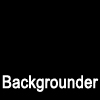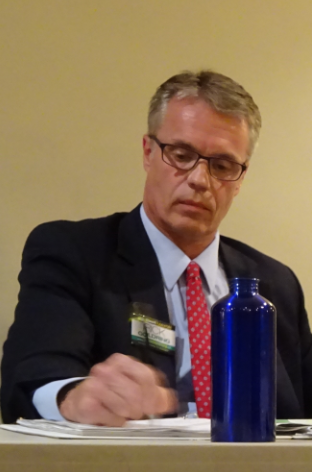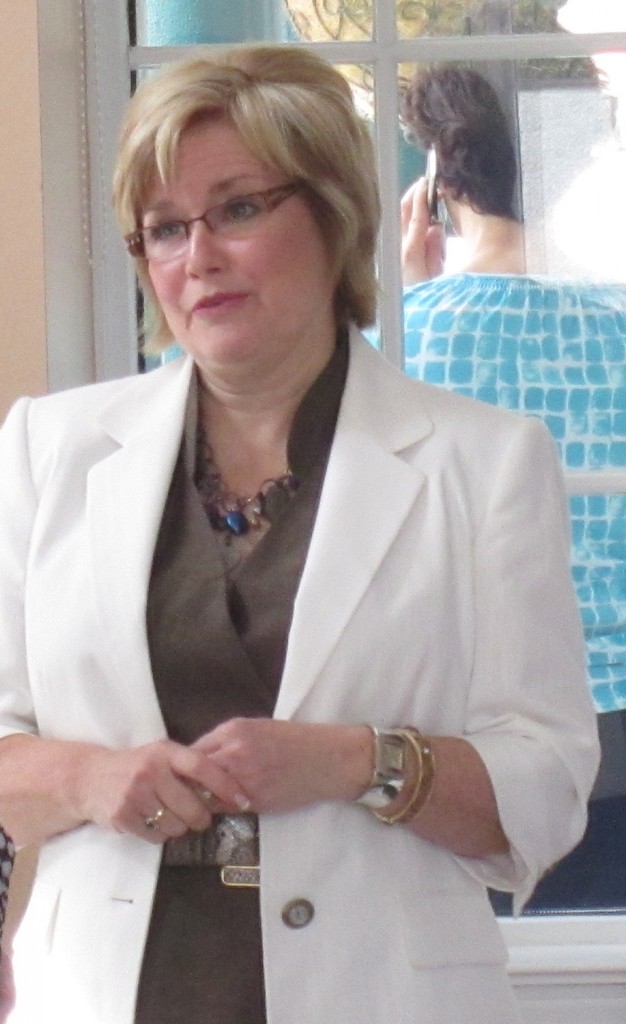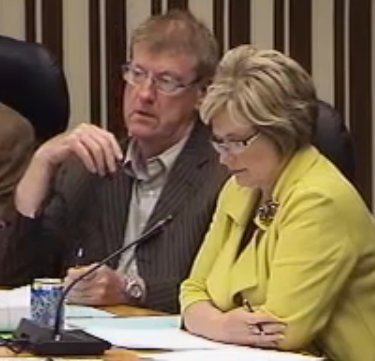 By Pepper Parr
By Pepper Parr
October 8, 2014
BURLINGTON, ON.
During the debate in ward four Tuesday evening Mayor Goldring brought out an interest he has been nurturing for some time. The current method of determining who the winner is in an election is the person who gets the most votes. They call that First Past the Post – it has its own acronym FPP.
Many people, including the Mayor see the FPP as unfair.

During the ward four debate Rick Goldring said he was in favour of a Ranked Ballot approach to municipal elections. Would he be Mayor today if that approach had been in place in 2006? l
Mayor Goldring would like to see that changed. In 2006 Goldring won the ward 5 council seat with just 28% of the votes cast.
The alternative that is being talked up – more than talked up actually – the Premier has mandated Ted McMeekin Minister of Community and Social Services to begin “a review of the Municipal Elections Act after the 2014 municipal elections”.
“You will ensure that the act meets the needs of communities, and that it provides municipalities with the option of using ranked ballots in future elections, starting in 2018, as an alternative to first-past-the-post,”
What is Ranked Voting ?
Mayor Goldring was well briefed on the concept of Ranked voting – although he didn’t explain exactly what it was all that well.
In a ranked-ballot system, voters cast ballots for preferred candidates — they mark their first choice; their second choice and third choice.
If a candidate does not get more than 50% of the votes on the first count – there is an immediate recount and the second choice votes are added in. If that gives on candidate 50% of the votes that candidate is declared the winner. If there was no candidate with 50% the third choice votes are added in.
There is no mention in the explanation as to how far out this goes – one would hope that three runs at this would find a winner.
So how would this have worked in the 2006 and 2010 elections?
In 2006 the results for Mayor were:
Cam JACKSON 14941
Joan LOUGHEED 13687
Rick BURGESS 12658
Philip PAPADOPOULOS 1393
Stephen KOLCUN 147

Cam Jackson: Election night 2010
Where would the Burgess, Papadopolous and Kolcun votes have gone if the Ranked balloting approach had been used. There are a lot of reasons to believe Burlington would not have had that four year Cam Jackson experience.
In Ward 4 the results were:
Jack DENNISON 3364
Frank McKEOWN 2517
John VERSLUIS 2085
Jeff ROTTAR 1010
Ross HICKS 915
It would be a stretch to think that the three lowest vote getters would split evenly between McKeown and Dennison. Would McKeown have won? Had he – he would not have been available to serve as Goldring’s Chief of Staff for the first half of the 2010-2014 term – and that would have made for a much different form of leadership from Goldring.
In 2006 the count was:
Rick GOLDRING 1848
Casey COSGROVE 1368
Fred SUTER 1185
Sam SARRAF 647
Bill BASTIEN 503
Vera KURNITZKI-WEST 342
Marnie MELLISH 305
David ABBOTT 253
Stephen BAULD 243
Casey Cosgrove believes that he would have beaten Rick Goldring which suggests Goldring would never have become Mayor.

Ward 6 Councillor Blair Lancaster thinking through the answer to a question. Tends to be cautious.
In 2010 the cliff hanger was the race for ward 6 where Mark Carr gave Blair Lancaster a really good run. Had he lived in the ward he might have taken it. Doubtful if ranked voting would have given the seat in 2010.
Blair LANCASTER 2,574 ELECTED
Mark CARR 2,449
Christopher MULHERN 575
Robb HERRIOT 248
Phil BUCK 176
The process continues until a candidate wins a simple majority of 50 per cent plus one.
Proponents argue it is more democratic, curbs vote-splitting, and leads to less polarizing politics because candidates run less negative campaigns over fears of alienating potential second-choice supporters.
Those opposed to the change warn ranked ballots can be confusing for voters — even though under the current “first-past-the-post” system, candidate routinely win with far less than 50 per cent of the vote.
Many think the municipal electoral system needs an overhaul. A ranked ballot system, for example, would make municipal elections less polarizing and produce a more accurate picture of what voters want.
In ranked-ballot voting, a candidate must secure a majority and wins if he or she has the most first-place votes; if the vote does not produce a true majority, an instant run-off would determine the winner.

Would Councillors Sharman and Lancaster have been elected in 2010 has Ranked Balloting been in place?
Currently, the “first past the post” system dictates the candidate with the highest number of votes wins.
When members of the Legislature are appointed to Cabinet they receive a “mandate” letter from the Premier in which what is expected of the minister is set out. These are usually confidential documents but Premier Wynne released them this time.
Mandate letters are the marching orders; “There aren’t too many surprises in them,” said Wynne.
In her mandate letter to Ted McMeekin, Wynne spells out the importance of leading “from the activist centre” with democratic reforms.
“We will place emphasis on partnerships with businesses, communities and people to help foster continued economic growth and make a positive impact on the lives of every Ontarian,” the premier wrote.
“This collaborative approach will shape all the work we do. It will ensure we engage people on the issues that matter the most to them, and that we implement meaningful solutions to our shared challenges.”
Ranked voting will challenge the way some municipal politicians have held their seats for so long.
















Dear Ms. Lewis,
I emailed the publisher of the Gazette about this very issue tonight. According to Ms. Angela Morgan at the elections office, whom I spoke with personally today, once you register online, there are several human steps that are gone through in her office to check for duplication etc. before you get a PIN, giving you access to vote. She told me that even though you can register to vote on line, each on line application is checked manually to avoid any possible issues. She could not tell me all the steps. I have no doubt in my mind, that my issues I raised earlier this month: The purging of the voters list, many voters where not showing up on the voters lists as a result, the late mailing of the Voter Notifications etc will have an impact on the final numbers. The Province has been notified of these issues.
I am more concerned that my vote is actually going to be counted by voting on line. Based on the lack of responsiveness by our City officials,,,, I do not trust any of them. I suggest you call your MP and get advice on voicing your election concerns and have them documented. Please leave City Hall out of it. If enough people show concern, the Province will step in to ensure we as Citizens are protected from fraud.
Editor’s note: This comment has been edited.
Ranked voting should have been implemented in the last century.
What does bother me a lot though, is online voting.
I personally know of 2 people that received more than one ballot. One received 4 ballots and one received a ballot for her husband who had died 10 years ago. These ballots could be used easier online than if a person had to physically show up at their polling station.
Another problem is that some households may have an abusive person in charge of the household and there’s nothing to stop them from standing behind their spouse and their voting age children to make sure they vote as they’re told.
I have no idea as to how online voting is handled in various institutions or just how private it is.
Online voting is convenient but it may not be very democratic.